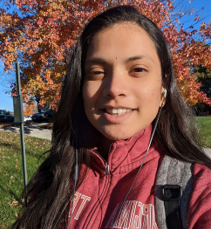Call for Participation
Collaborative XR for Learning, Simulation, and Cooperative Experiences
Monday, 23 June 2025, 13:30 - 17:30 CEST
Organizers
Nikitha Donekal Chandrashekar1, a, Prasanna Routray2, b, Manivannan Muniyandi2, c, Denis Gračanin1, d
1Department of Computer Science, Virginia Tech, USA
2Department of Applied Mechanics and Biomedical Engineering, IIT Madras, India
anikitha@vt.edu, bam19d028@smail.iitm.ac.in , cmani@iitm.ac.in , dgracanin@vt.edu
Aim of the Workshop
The workshop aims to gather researchers, developers, and practitioners to explore and understand innovations and challenges in designing immersive, multimodal collaborative XR environments. The focus is on interdisciplinary applications, including professional training, cooperative learning, and real-time simulation. Participants will discuss cutting-edge research, practical implementations, and potential future directions for enhancing collaborative experiences in XR. Key topics will include advances in collaborative scenario design, real-time interaction, and user experience, especially in navigating complexities introduced by Cognitive Load and Uncanny Valley Theory, which impact user performance and emotional response. With applications ranging from professional team training to educational and research contexts, these systems present unique challenges in terms of scenario design, real-time interaction, and user experience. This workshop invites researchers, developers, and practitioners to present their latest work, share best practices, and discuss the future of Collaborative XR environments.
Expected Workshop outcome
The workshop aims to facilitate knowledge sharing between practitioners, researchers, and scholars in the field of Collaborative XR, while working on the important topic of collaborative interactions. Participating authors will have the option of publishing their contribution in conference proceedings published by Springer, for presentation at the Conference and inclusion in the ``Late Breaking Work'' conference proceedings.
Workshop topics
The topics include:
- Design, development and evaluation of multi-user XR systems.
- Technical challenges in creating real-time collaborative environments.
- Applications of Collaborative XR in professional and educational training.
- Integration of AI and machine learning for dynamic, interactive multi-user XR scenarios.
- Evaluation methodologies for multi-user XR.
Workshop agenda
Schedule for the Workshop
|
1:30 pm - 1:45 pm (CEST) |
Introduction |
|
1:45 pm - 2:30 pm (CEST) |
Keynote Talk |
|
2:30 pm - 4:30 pm (CEST) |
Paper Presentations |
|
4:30 - 5:30 pm (CEST) |
Discussion and Conclusion |
Presentation Schedule
Authors of full papers will be given overall 20 minutes each for the presentation. This time will include 15 minutes for presentation and 5 minutes for Question and Answer.
|
Paper |
Timings |
|---|---|
|
5883: Collaborative Extended Reality Gaming for Pediatric Perioperative Care |
2:00 pm - 2:20 pm (CEST) |
|
5897: Collaborative Digital Twins and Embodied Conversational AI tutor in Virtual Workforce Training |
2:20 pm - 2:40 pm (CEST) |
|
5936: A Review of AR and VR Applications in Education: Shaping the Future of Learning |
2:40 pm - 3:00 pm (CEST) |
|
5994: Immersive and Collaborative Indian Wedding: A Virtual Reality Experience of Rituals, Celebration, and Cuisine |
3:00 pm - 3:20 pm (CEST) |
|
5904: A Suite of Spatialized Sonifications for the Tesseract |
3:20 pm - 3:40 pm (CEST) |
|
5884: Dear Younger Me: From Lived Experience to Extended Reality |
3:40 pm - 4:00 pm (CEST) |
Keynote Speaker

Dr. Kunal Gupta
Dr. Kunal Gupta is a research fellow at the Empathic Computing Lab at the University of Auckland. His work bridges the gap between Human-AI Interaction and emotion recognition technology, focusing on mental well-being and cognitive rehabilitation. In my PhD research, His research focuses on using physiological computing—such as brainwaves, skin conductance, and heart rate variability—to create adaptive virtual environments that respond to users' emotional and cognitive states in real time.
Currently, he is leading projects on empathic digital agents for mental health and empathic characters for cognitive rehabilitation in VR, where AI-driven interventions are designed to support recovery and enhance emotional well-being. By combining insights from AI-driven mental health interventions and immersive virtual environments, his research advances the development of personalized, context-aware virtual agents and characters.
Guidelines to prospective authors
Submission for the Workshop
Prospective authors should submit their proposals in PDF format through the HCII Conference Management System (CMS).
Researchers are invited to submit research, survey, work-in-progress, or position papers:
- Research or survey papers: maximum 6 pages excluding references
- Work-in-progress papers: maximum 3 pages excluding references
- Position papers: maximum 2 pages excluding references
Submission for the Conference Proceedings
The contributions to be presented in the context of Workshops will not be automatically included in the Conference proceedings.
However, after consultation with the Workshop organizer(s), authors of accepted Workshop proposals who are registered for the Conference are welcome to submit, through the Conference Management System (CMS), an extended version of their Workshop contribution to be considered, following further peer review, for presentation at the Conference and inclusion in the “Late Breaking” volumes of the Conference proceedings, either in the LNCS as a long paper (typically 12 pages, but no less than 10 and no more than 20 pages), or in the CCIS as a short paper/extended poster abstract (typically 6 pages, but no less than 4 and no more than 11).
Workshop deadlines
|
Submission of workshop contributions |
4 April 2025 |
|
Authors notified of decisions on acceptance |
18 April 2025 |
|
Finalization of workshop organization and registration of participants |
2 May 2025 |
Workshop organizers

Nikitha Donekal Chandrashekar
Nikitha is doctoral candidate in the Department of Computer Science, Virginia Tech. She works on Collaborative XR systems and interdisciplinary team training, with a focus on designing immersive XR environments for professional medical team training.

Prasanna K. Routray
Prasanna is a doctoral candidate in the Department of Applied Mechanics and Biomedical Engineering at IIT Madras. He works on sensor design and analysis, with a focus on robotics and XR applications.

Manivannan Muniyandi
Manivannan M. is a professor in the Department of Applied Mechanics and Biomedical Engineering in IIT Madras, India. His research expertise includes haptics, psychophysics, XR, computer graphics, medical simulations and bio inspired sensors analysis. He has set up and is the principal investigator of the Touch Lab at IIT Madras.

Denis Gracanin
Denis Gracanin is an Associate Professor at the Department of Computer Science, Virginia Tech. His research expertise includes XR, simulation, human-computer interaction, cybersecurity and privacy, with a focus on immersive environments for simulations and training. He is the principal investigator of the Distributed Virtual Environments Lab at Virginia Tech.
Registration regulation
Workshops will run as 'hybrid' events. Organizers are themselves expected to attend ‘on-site’, while participants will have the option to attend either 'on-site' or 'on-line'. The total number of participants per Workshop cannot be less than 8 or exceed 25.
Workshops are ‘closed’ events, i.e. only authors of accepted submissions for a Workshop will be able to register to attend the specific Workshop, complimentary with their Conference registration.


